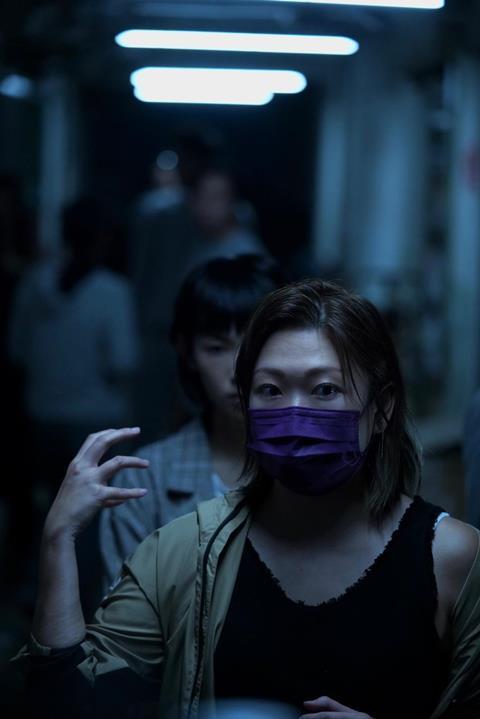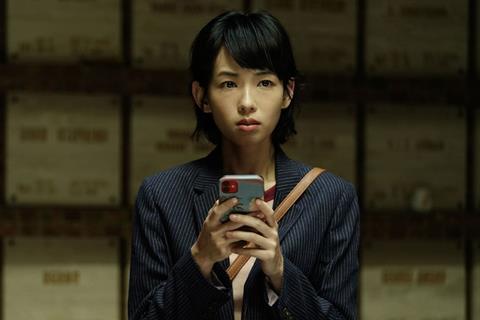
Hong Kong director Gilitte Leung has moved into horror with Social Distancing, which will receive its world premiere at South Korea’s Bucheon Fantastic International Film Festival (Bifan) on July 11.
The film, which marks Leung’s second feature, will play in Bifan’s Bucheon Choice competition and was backed by Emperor Motion Pictures and Louis Koo’s One Cool Film Production through a partnership to support the Hong Kong industry in the pandemic. It also received the support of the Hong Kong Film Development Fund and Create Hong Kong.
The supernatural thriller centres on an internet-obsessed woman who spends her days on her phone until a sinister e-ghost starts to intrude on her life. The cast includes Gladys Li (You Are The One), Jeana Ho (Deception Of The Novelist) and Angus Yeung (Raging Fire).
The script was also written by Leung who studied fashion design and worked as a pop music composer before making medium-length film Groundwalk in 2005 and feature debut Love Me Not in 2012, which screened at Karlovy Vary, Stockholm and Vancouver among other film festivals.
The filmmaker spoke to Screen about making the shift into horror, the different Chinese title and moving from an indie to studio-backed feature.
Your feature debut, Love Me Not, was an LGBTQ+ romantic drama. Now you have a supernatural thriller as your second film. What attracted you to the horror genre?
Like most female directors, I started off with romance, but I wanted a different angle. Love Me Not ended up as a light-hearted subversive LGBT drama about the relationship between a gay man and a lesbian woman.
Horror stories allow me to think out of the box. My imagination can run wild without boundaries. I don’t have to worry if something is logical or not. The real and the unreal, and the certainty and uncertainty, create endless possibilities.
The horror format sometimes is just a packaging. Despite the supernatural elements, Social Distancing is about human nature.

The English title, Social Distancing, is not the same as the Chinese title, which literally means “electronic ghosts”. What are “e-ghosts” and how did you come up with the idea?
The English title, which references the pandemic, came to mind first, which also reflects the story well. Mobile phones or electronic devices are meant to bring us closer, but on the contrary they keep us apart when we are too obsessed with them.
We can’t live without our mobile devices these days, which make us vulnerable if we rely on them too much. The mobile devices know us inside out, better than anyone or anything else. If a doll like Annabelle can be possessed by evil spirits so can electronic gadgets.
Telecommunication networks like WiFi and 5G transmit our private data every day, but they are invisible, just like the e-ghosts living in the digital world which have easy access to our data.
Love Me Not was a super indie film on a shoe-string budget, whereas Social Distancing is a proper commercial film backed by studios. How did you navigate the transition?
Love Me Not was totally self-funded. Apart from having a producer, I did almost everything myself to save on the budget. I was the director, writer, editor, composer and one of the DoPs. I handled all the festival submissions and, with my producer’s help, organised about 40 screenings in Hong Kong by booking directly with the cinemas.
Social Distancing is teamwork. I focused on writing and directing this time, not even composing. I enjoyed working with my team. I have learnt how to delegate and trust them. There’s unexpected chemistry. Our creative team has a few women such as producer Julia Chu [Port Of Call] and art director Irving Cheung who did Juno Mak’s vampire film Rigor Mortis.
Almost every filmmaker thinks it’s much tougher to make a second film than the first. What have you been working on in the 10 years since Love Me Not?
I have had four to five projects such as soft sci-fi Written Future, selected for the Golden Horse project market in 2013, and Breathing, about a woman who takes up Thai boxing, in HAF in 2015. There were people who were interested. I got paid to develop and revise the scripts but it’s a false start every time and the project failed to take off. It’s like a woman who wants to get pregnant but suffers many miscarriages.
Before the pandemic in 2019, I spent three months in Berlin as an artist-in-residence for the Medienboard Berlin-Brandenburg, developing Annie The Nude, a romance drama about a nude model. I came up with the idea of Social Distancing during the residency.
I’ve learnt to take it easy because of the previous projects. But things happened real fast for Social Distancing. From pitching to writing the script and wrapping the shoot in October 2020 was just five months.

























No comments yet